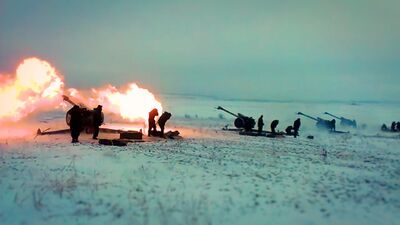Battle of the Ullan Line
| Battle of the Ullan Line | |||||||
|---|---|---|---|---|---|---|---|
| Part of 2019 Invasion of Vyzhva | |||||||
 Jedorian artillery fires on Vyzhvan positions | |||||||
| |||||||
| Belligerents | |||||||
|
| Vyzhva | ||||||
| Commanders and leaders | |||||||
| Major General Virginijs Jukums | XXX | ||||||
| Units involved | |||||||
| 4th Order | II Corps | ||||||
| Strength | |||||||
| 175,000 | ~70,000 | ||||||
| Casualties and losses | |||||||
|
261 killed 31 missing 1,419 wounded |
2,000 killed 10,000 wounded 15,000 captured | ||||||
The Battle of the Ullan Line was the opening phase of the ground campaign against Vyzhva by Jedoria during the 2019 Invasion of Vyzhva. Jedorian forces began the battle by shelling Vyzhvan defensive positions, collectively known as the Ullan Line for a 24 hour period before ground forces crossed the border and engaged the Vyzhvan II Corps. By 17 February Jedorian forces had breached the Ullan Line in multiple sectors and had forced the majority of II Corps to coalesce into a pocket along the coast, known as Area of Operations Verdict. This was in line with Jedorian objectives to isolate II Corps and pave the way for the introduction of the reserve 6th Corps.
Background
Following the Vyzhvan-Jedorian War, the defense strategy of the People's Mobilization forces along the Jedorian border focused on a system of fortifications known as the Ullan Line. This system of bunkers, pre-sighted artillery positions, pillboxes and minefields was to be manned by a force of ten divisions. Mechanized infantry were to form the bulk of the defensive line, absorbing the expected enemy assault, and after it had been stalled a mobile reserve force consisted of tank and mechanized divisions was to counterattack to drive the invaders back across the border. Construction of the Line is believed to have begun shortly after the end of hostilities, but it is uncertain is the Line was ever considered "complete".
Following the Jedorian Civil War, Vyzhvan defensive planning began to shift away from viewing Jedoria as the biggest threat and replaced it with the Galenosphere nations, causing funding and attention to be diverted away from the Ullan Line. Although supposed to be manned by ten divisions, Vyzhvan forces in the area amounted to only 7 divisions, of which only two were considered active. About a week prior to the commencement of the invasion, Vyzhvan forces appeared to begin occupying their fortifications, but this process was still ongoing by the time the Coalition began Operation Geas. As a result, many parts of the Ullan Line were either unoccupied or under strength. Many of the fortifications were also outdated and poorly placed, resulting in isolated positions unable to support one another. Many of the minefields had already been identified by Jedorian intelligence, and there did not appear to be any effort on the part of II Corps to redeploy mines or deploy new mines.
Course of the battle
Jedorian artillery began shelling Vyzhvan positions at 3 a.m. local time, targeting the Ullan Line, border outposts, and suspected troop concentrations. According to Universal News, more than 700 Jedorian guns were used in the opening barrages. Jedorian artillery continued firing for almost 24 hours throughout the 15th, expending nearly 150,000 shells and rockets during that time period. While the shelling was ongoing Jedorian ground forces began breaching the border in multiple locations, seizing tactical zones and areas of value while Vyzhvan forces were still reacting to the barrage. By the 16th most of the Vyzhvan defenses had been destroyed in the shelling or seized by Jedorian ground forces. By midday on the 16th the 9th Armored Division had blown through most the Vyzhvan defenses in their sector, forming a pincer action with the 75th Armored Division against the defending Vyzhvan 3rd Infantry Division. Further south, the 29th Mechanized Infantry Division fought off a major counterattack by the 17th Armored Brigade. By destroying the 17th Armored Brigade, the 29th Mechanized Infantry was able to cut south through the destroyed Vyzhvan defenses, forming the southern pincer to the Jedorian operational plan. By the 17th what was left of the 3rd Infantry Division and 17th Armored Brigade had been forced northward by the 15th Corps assault. By day 3 of the invasion II Corps had been forced out of it's defensive positions along the Ullan Line and had coalesced into what the Jedorians called Area of Operations Verdict.
Aftermath
Jedorian forces were able to breach Vyzhvan defenses within 36 hours, while II Corps forces in the area were unable to effectively resist Jedorian breakthroughs into their tactical rear. Vyzhvan command and control, already highly centralized and inflexible, was heavily disrupted by Coalition airstrikes on higher headquarters. II Corps was unable to effectively respond to the invasion despite some forewarning, resulting in many defensive positions being left unoccupied, and reserves being only partially mobilized. The 3rd Infantry Division was in poor position to repulse the Jedorian attack, and the counter attack by the 17th Armored Brigade was committed piece meal and easily repelled. Much needed reserves to bolster the Vyzhvan lines were slow to arrive, and by the time they were forming, most supply depots and forward airfields had been overrun by Jedorian forces. For the Jedorians, the 4th Order's offensive successfully forced II Corps to pull back in a northward direction, eventually causing the encirclement of Vyzhvan forces within AO Verdict.